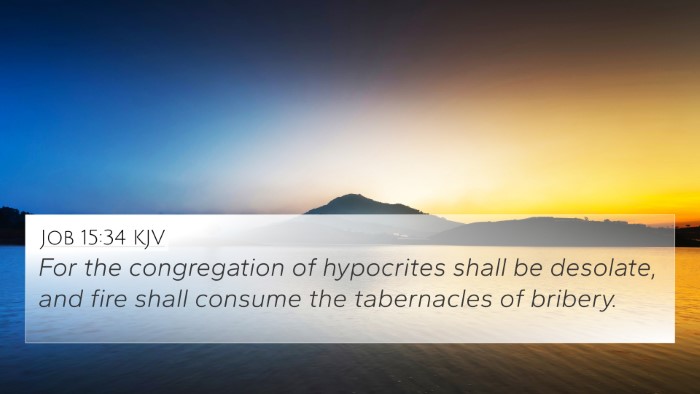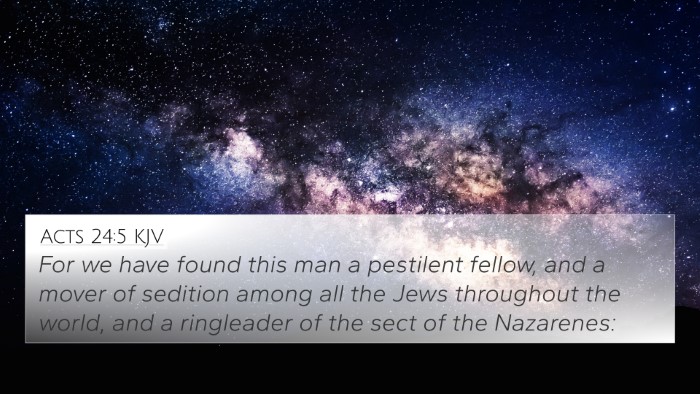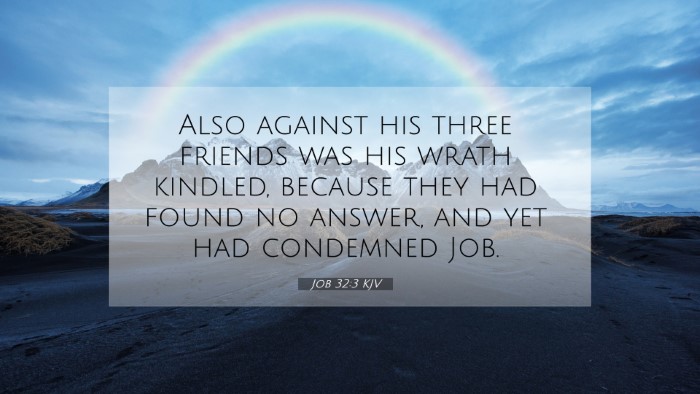Old Testament
Genesis Exodus Leviticus Numbers Deuteronomy Joshua Judges Ruth 1 Samuel 2 Samuel 1 Kings 2 Kings 1 Chronicles 2 Chronicles Ezra Nehemiah Esther Job Psalms Proverbs Ecclesiastes Song of Solomon Isaiah Jeremiah Lamentations Ezekiel Daniel Hosea Joel Amos Obadiah Jonah Micah Nahum Habakkuk Zephaniah Haggai Zechariah MalachiJob 32:3 Similar Verses
Job 32:3 Cross References
Also against his three friends was his wrath kindled, because they had found no answer, and yet had condemned Job.
Uncover the Rich Themes and Topics of This Bible Verse
Listed below are the Bible themes associated with Job 32:3. We invite you to explore each theme to gain deeper insights into the Scriptures.
Job 32:3 Cross Reference Verses
This section features a detailed cross-reference designed to enrich your understanding of the Scriptures. Below, you will find carefully selected verses that echo the themes and teachings related to Job 32:3 KJV. Click on any image to explore detailed analyses of related Bible verses and uncover deeper theological insights.

Job 8:6 (KJV) »
If thou wert pure and upright; surely now he would awake for thee, and make the habitation of thy righteousness prosperous.

Job 26:2 (KJV) »
How hast thou helped him that is without power? how savest thou the arm that hath no strength?

Job 15:34 (KJV) »
For the congregation of hypocrites shall be desolate, and fire shall consume the tabernacles of bribery.

Job 24:25 (KJV) »
And if it be not so now, who will make me a liar, and make my speech nothing worth?

Acts 24:5 (KJV) »
For we have found this man a pestilent fellow, and a mover of sedition among all the Jews throughout the world, and a ringleader of the sect of the Nazarenes:
Job 32:3 Verse Analysis and Similar Verses
Understanding Job 32:3
Job 32:3 states, "Also against his three friends was his wrath kindled, because they had found no answer, and yet had condemned Job." In this verse, we witness a pivotal moment in the Book of Job where Elihu, the younger speaker, expresses his indignation not only toward Job's friends but also emphasizes Job's unjust condemnation. This passage offers layers of meaning when analyzed through various commentaries.
Contextual Analysis
The Book of Job typically revolves around the themes of suffering and divine justice. In this specific verse, Elihu's response marks a transition in the dialogue, pinpointing the failure of Job's friends to justify their accusations against him. They had not only misjudged Job’s situation but also their analysis reflected a failure to understand God's true nature and purpose in human suffering.
Insights from Public Domain Commentaries
-
Matthew Henry:
Henry emphasizes that Elihu's anger is justified due to the lack of satisfactory responses from Job's friends. He notes that their attempts to explain Job’s suffering led them to erroneously condemn him without adequate justification, revealing a profound truth about human frailty in interpreting divine will.
-
Albert Barnes:
Barnes provides a detailed exploration of the psychological implications of this verse, pointing out that Elihu’s criticism highlights a failure of wisdom among Job's friends. His commentary suggests that when one lacks understanding, like Job's friends, they may resort to condemning rather than helping.
-
Adam Clarke:
Clarke delves into the character of Elihu, identifying him as a voice of truth amid confusion. He notes how the young man's passionate response serves to correct and direct the discourse towards a more accurate understanding of God's ways, insisting on the importance of humility in seeking divine wisdom.
Thematic Connections
Job 32:3 is rich in thematic connections that relate to broader Biblical principles of justice, human suffering, and the role of wise counsel. The following cross-references illustrate these connections:
- Proverbs 18:2: "A fool takes no pleasure in understanding, but only in expressing his opinion." - This verse underscores the folly of jump-to-conclusions without understanding the circumstances.
- Job 4:7: "Consider now: Who, being innocent, has ever perished? Where were the upright ever destroyed?" - This reflects the misunderstandings that Job's friends displayed in their reasoning.
- James 1:19: "My dear brothers and sisters, take note of this: Everyone should be quick to listen, slow to speak and slow to become angry." - A principle highlighting the importance of careful communication, which Elihu embodies.
- Ecclesiastes 7:5: "It is better to heed the rebuke of a wise person than to listen to the song of fools." - This echoes Elihu's role as a voice of reason emerging from the chaos of false judgments.
- Psalms 37:30-31: "The mouths of the righteous utter wisdom, and their tongues speak what is just; the law of their God is in their hearts; their feet do not slip." - This reflects the righteousness that Elihu strives to express.
- Isaiah 5:20: "Woe to those who call evil good and good evil." - A reminder relevant to the falsehoods pronounced by Job's friends.
- Romans 14:10-12: "You, then, why do you judge your brother or sister? Or why do you treat them with contempt? For we will all stand before God's judgment seat." - This highlights the ultimate accountability individuals have before God, paralleling Job's situation.
Conclusion
Job 32:3 and its surrounding context invite deep reflection on the way we communicate about others' struggles and the importance of wisdom. Elihu's emergence as a voice of truth can inspire believers to pursue righteousness and patience in understanding. The cross-references provided here serve as an invaluable tool for anyone seeking to explore these connections and deepen their understanding of Biblical texts through comparative analysis. This exercise in scriptural cross-referencing can illuminate broader themes in the Bible and enhance personal study or sermon preparation.






